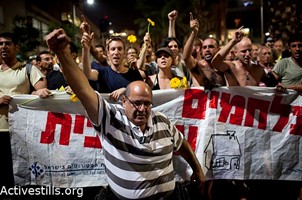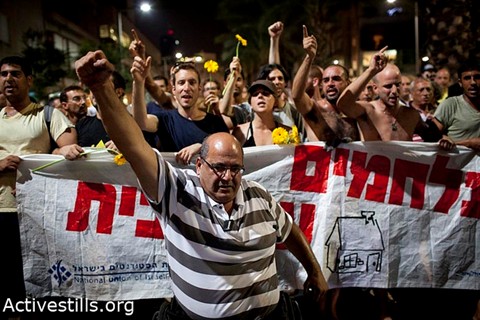
A mass rally against the escalating housing prices were set to take place tomorrow (Saturday night) at Tel Aviv. Leaders of the Tel Aviv “tent city” protest said they were entering a new stage in their fight against rent prices, declaring at a press conference Wednesday that they would hold a mass demonstration in Tel Aviv tomorrow to which they would invite all the tent cities set up across the country.

“The struggle is entering a new phase. We are announcing a massive demonstration on this coming Shabbat, the 23rd of July 2011. We call on all of the tent cities from across Israel to come to the tent city [in Tel Aviv]. We will lay our demands before the government of Israel and regain our rights.
“This is our country, and the time has come to return it to the people,” said Daphni Leef, 25, the Tel Aviv resident who started the nationwide protest when she launched a Facebook group nearly two weeks ago. “Israel’s government continues to disappoint us, and we feel betrayed” said.
The organizers explained earlier that the press conference comes in response “to the prime minister, finance minister and housing minister’s disregard for our plight for affordable housing.” In her declaration, Leef charged that “most of this country has been deprived of its basic rights until we got to the situation where [people] aren’t free anymore. We are enslaved. Most of us barely manage to survive, and others are no longer supporting the burden.” Until now (Friday) there are “tent protest cities” around Israel: from Kiryat Shmona, near the Lebanese border, to Eilat, in the Red Sea. Others tent cities are located in Haifa, Kfar Sava, Afula, Herzlyia, Jaffa, Mount Meron, Holon, Rehovot, Jerusalem, Sderot, Ashdod, Tamra and Beer-Sheva
Also Wednesday, the Israel National Students Union announced that they would keep supporting the protests until the government came up with solutions to provide affordable housing for the masses. The union, which has taken a leadership role in the protests outside Tel Aviv, added that it would be intensifying the protests – citing the example of the short-term blocking of an intersection in Kiryat Shmona on Wednesday. Yesterday, a group of squatters took over an abandoned building on Rothschild Boulevard in Tel Aviv, near the site of the tent protect. The squatters say that they will take over more buildings in the city.
Police cleared students who were blocking the corner of Frishman and Dizengoff streets in Tel Aviv Thursday morning, protesting what they say are exorbitant rent prices. Students came to the corner, where construction is underway for a new luxury high-rise building, earlier in the morning attempting to disrupt construction work. Police threatened the activists with restraining orders and arrest which caused students to evacuate the premises.
Extreme right-wing student group Im Tirtzu announced Wednesday that it was pulling out of the main tent protest on Tel Aviv’s Rothschild Boulevard against rising housing prices because it was concerned about the organizers’ political aims. Ronen Shoval, founder of Im Tirtzu, met with a handful of the protest organizers earlier this week, who are, according him, “a bunch of leftists and communists”
The tent city rent protests that have spread across the country – and seized the headlines – have hardly seen any activists from the Arab sector, which makes up some 20 percent of the Israeli population. According to community activists, the housing crisis in the Arab sector is significantly worse than that among Israeli Jews, but is caused by factors completely unrelated to those bringing the crowds to the tent cities.
Dr. Anaya Bana of the Eilaboun-based Arab Center for Alternative Planning said that since most of the land in the Arab sector is privately owned, it is very difficult for the state to free up land for building projects. Bana said that public housing only exists in a few cities such as Nazareth, Haifa, Ramleh, Lod, Jaffa and Tarshiha, and that the paucity of building permits severely hedge in Arab communities. “All of the concepts facing us are different. Those who don’t own land that is zoned for building have nowhere to go. So there is a much more serious problem [in the Arab sector]. It’s not just about the real estate prices, it’s about the fact that there isn’t anywhere for people to go.” Many who do own land find that they can’t attain permits, and end up building illegally – often facing the threat of state eviction from their property.
Related:
The massive protest against high housing costs spread to additional cities


